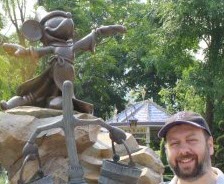Mickey Mouse Organization: Lessons to Learn and Unlearn from Disney
Just spent a great day in Hong Kong Disneyland. Judging by many of the kids I was watching, Disney may be, as they claim, the happiest place on Earth.

What to learn:
- Disney is the master at execution. Whenever I’m at a different amusement park I think of how Disney would have less downtime loading and unloading the rides, how the lines would be more enjoyable, etc. (Exception: Universal’s Islands of Adventure in Orlando has learned all the right lessons). Re-reading this I notice that what most creates magic for me is the removal of frustrations. Maybe, to steal an old phrase about how to sculpt a lion, creating magic is mostly about removing everything that’s not magic. I later expanded on this idea at To Create Magic: Sculpt Away Everything That Isn’t Magic.
- Disney is pure and uncynical, hopeful and wholesome. It’s like Enchanted, Disney’s response to Dreamwork’s Shrek (which was Dreamworks’ response to Disney’s Sleeping Beauty). The movie’s beauty was summed up in the line “you said that without a hint of sarcasm.”
- Tremendous creativity. Here I’m speaking more of Disney’s movies. What moves me the most are their song lyrics. Others are moved more by the animation, the voice acting, the music, etc. It’s all brilliantly creative.
- Bringing it all together. They’ve done a great job with their brand. The amusement park, the movies from the last two decades, the original cast (Mickey & friends) … they just all combine to make the park magical.
What to unlearn:
- If you think you have to be Disney, think again. Universal Studios and Dreamworks did fantastic jobs being not-Disney. Dreamworks’ Shrek is a brilliant movie, made possible by Disney’s brilliance and lack of cynicism, which provided a beautiful opening for a great satire. Even as I was admiring Disney’s It’s a Small World, I couldn’t help thinking about Shrek’s DuLoc (my wife couldn’t stop thinking about Charlie and the Chocolate factory’s spoof of the same scene). Universal positioned itself to the teens who had outgrown Disney. They all executed brilliantly.
- This is the part that I hate saying. I loved seeing the kids moved by Disney’s message of dreaming big and following your heart. Kids need that. So do adults. But adults need something else too. I think the movie Fame did teens a great service with its surprise scene where the former senior class’s greatest performer is waiting tables. I’m sorry, but hope is not a strategy, and sometimes Disney makes us forget that. I guess Billy Joel covered the subject best with “Dream on, but don’t imagine they will all come true.”
- Similarly, I think J.K. Rowling did teens a great service when she introduced a Minister of Magic who lacked the courage and integrity to recognize and fight evil, and who chose instead to fight and ridicule those who were standing up to evil. The world has far too many Cornelius Fudge’s and we need to forget those scenes in Disney where the good guy can just wait for the bad guy to accidentally kill himself.
To summarize:
- Disney created magic, with remarkable creativity and execution. They’ve been raising generations to be more tolerant, hopeful, imaginative, and believing. They’ve done the world a great service. See what you can do in your company with less cynicism and more goodwill.
- If you’re making management decisions, you’d better be sure you understand that while cynicism can be bad, critical thought is essential. Too often I think managers make what I call Star Trek decisions: “Will it work? It has to. It’s our only hope.” You owe your people more.
- The biggest part of making magic is removing all those things that are not magic, those frustrations and humiliations that drive your employees and customers crazy, sapping the magic out of them.
Provide your people the magic they deserve … better yet, let your people create magic. But do it responsibly.
October 16, 2009 @ 3:28 pm
couldnt agree more
October 16, 2009 @ 8:28 am
couldnt agree more